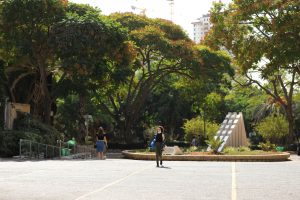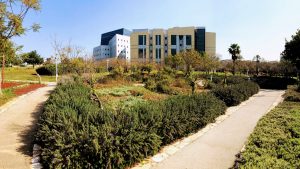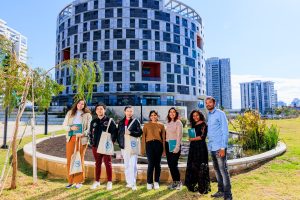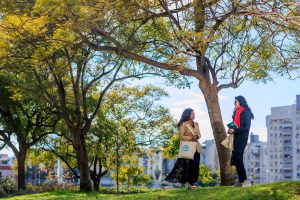Home » Programs » Full Degree Programs » BA in English Literature


Bar-Ilan University prides itself on its top-quality English Literature BA program. Led by a warm and dedicated faculty, students develop their analytical and self-expression skills in a supportive, culturally-diverse environment.
The BA in English Literature provides students with a solid foundation in the history and development of English and American literature, spanning the work of great canonical authors such as Shakespeare, Milton, Austen, and Dickens as well as contemporary authors, while also aiming to develop high-level skills of analysis, critical thinking, argumentation, and self-expression.
The added benefit of studying at BIU is the unique opportunity to consider how Jewish literature and thought have intertwined with the history and development of literature in English.
Seminars in translation and creative writing are also offered, as is an exploration into the fields of literature and gender, literature and the visual arts, or literature and religion, to name a few.
Upon completion of the degree, students can look forward to a wide range of careers in teaching, content writing, and other fields requiring advanced skills of analysis and expression.
BA Literature and Linguistics (Double Major)
In addition, the double major with Linguistics is offered to students who would like to specialize not only in English Literature but also in Linguistics. This is an excellent opportunity for those students seeking a combined knowledge of both fields in their career or continued academic endeavors.
For a full list of electives taught in the department, click here.
For a full list of seminars taught in the department, click here.

Application for Undergrad\Grad Studies for 2025-2026 will open on February 2nd
First-Year Courses

This course is designed to help students gain proficiency in writing academic analyses of literary works.
Continuing from “Advanced Academic Writing I,” this course continues to develop students’ academic writing skills and prepares them for more advanced literature courses in their second year.
The course aims to introduce students to the basic concepts used in the analysis and interpretation of fictional narrative.
A background course in the history of Western thought with close reading, in English, of primary sources from ancient Greece and Rome.
A detailed study of the elements of poetry: figurative language, rhyme, rhythm, structure and genre.
Second- and Third-Year Surveys

This course provides a survey of the prose and poetry of the early modern period from Wyatt and Surrey through Milton.
A survey of the development of imaginative writing in American literature from Colonial times to the Civil War.
This overview of British literature from 1660 to 1890 surveys the major trends in English literature from the late 17th through the 19th centuries.
A study of Shakespeare’s major plays in the context of the theatrical conditions of his time and the intellectual assumptions of the period in which he wrote.
Sample Seminars (Offerings vary each year)

The course explores how ideas of aberrance and monstrosity have shaped representations of women in English and American literary works over the centuries.
This seminar offers an overview of the sphere of contested influences and dynamic change that shape the English poetic tradition from the late Renaissance through contemporary verse.
The course views genre distinctions as a question of degree rather than category. We will examine skills necessary in all forms of creative writing while addressing the most salient generic features of poetry, essays, and fiction, but we will understand that often distinctions can be artfully blurred to release tremendous energy and creativity.
In this course students read a series of detective narratives, using the lens of literal investigation to inform our understanding of the act of literary interpretation.
This course explores the tension between studying Shakespeare as an historically situated, contextualized dramatist and studying a Shakespeare who is “our contemporary,” a universalized, ahistorical participant in current popular culture.
This seminar explores the intersection of fictional texts about reading others’ minds and narrative theories about why our minds love to read fiction in the first place.
A comparative study of how fiction and fact structure each other in literature portraying the Shoah, atrocity, and mass human-rights abuse.
In this seminar, we survey American literature – from the seventeenth to the early twentieth century – with an eye to the way the stories writers tell about themselves inscribe versions of the process of assimilation.
This course focuses on ways that the genre of autobiography has been transformed and newly conceived in the last few decades to include forms such as correspondences, graphic novels, autofiction, and variations of all kinds of memoir.
This course looks at narratives of assimilation, accommodation, and return and discuss the many ways Jewish identities (religion and ethnicity) are constructed in a broad range of texts and genres.
Sample Electives (Offerings vary each year)

This course considers literary texts that meditate on the purposes, strategies, and experiences of what we call “education.”
This course offers a general introduction to the rich tradition of children’s literature in English since the 19th century.
This course offers an introduction to the rich tradition of African-American writers as we consider the texts’ concerns with the boundaries of identity, the legacy of slavery, and the role and responsibilities of the black artist living in a predominantly white society.
This course examines texts and the art that has sprung from them through reading, listening, viewing, experiencing, and attending performances and exhibitions.
In this course, we will seek to understand how rhetoric works by analyzing different forms and genres, from speeches and commercials to political cartoons. To provide a theoretical basis for our analytical work, we will study the foundational theories of both classical and contemporary rhetoric.
This course surveys the movement known as Romanticism in its British form between the years 1789 and 1830.

International School
Bar-Ilan University
Ramat-Gan, Israel 5290002
Tel: +972- 3-738-4245
Email for further information
[email protected]
Leave your details and we’ll get back to you soon
Explore a range of undergraduate degrees in English, including Political Science, Communication, and Humanities. We also offer 16 diverse graduate programs and a brand-new Cyber Security & Data Protection certificate – all in English!

If you find an error in content or missing information – please update us. In any case, the binding information appears on the website of the Council for Higher Education.
We firmly believe that the internet should be available and accessible to anyone, and are committed to providing a website that is accessible to the widest possible audience, regardless of circumstance and ability.
To fulfill this, we aim to adhere as strictly as possible to the World Wide Web Consortium’s (W3C) Web Content Accessibility Guidelines 2.1 (WCAG 2.1) at the AA level. These guidelines explain how to make web content accessible to people with a wide array of disabilities. Complying with those guidelines helps us ensure that the website is accessible to all people: blind people, people with motor impairments, visual impairment, cognitive disabilities, and more.
This website utilizes various technologies that are meant to make it as accessible as possible at all times. We utilize an accessibility interface that allows persons with specific disabilities to adjust the website’s UI (user interface) and design it to their personal needs.
Additionally, the website utilizes an AI-based application that runs in the background and optimizes its accessibility level constantly. This application remediates the website’s HTML, adapts Its functionality and behavior for screen-readers used by the blind users, and for keyboard functions used by individuals with motor impairments.
If you’ve found a malfunction or have ideas for improvement, we’ll be happy to hear from you. You can reach out to the website’s operators by using the following email
Our website implements the ARIA attributes (Accessible Rich Internet Applications) technique, alongside various different behavioral changes, to ensure blind users visiting with screen-readers are able to read, comprehend, and enjoy the website’s functions. As soon as a user with a screen-reader enters your site, they immediately receive a prompt to enter the Screen-Reader Profile so they can browse and operate your site effectively. Here’s how our website covers some of the most important screen-reader requirements, alongside console screenshots of code examples:
Screen-reader optimization: we run a background process that learns the website’s components from top to bottom, to ensure ongoing compliance even when updating the website. In this process, we provide screen-readers with meaningful data using the ARIA set of attributes. For example, we provide accurate form labels; descriptions for actionable icons (social media icons, search icons, cart icons, etc.); validation guidance for form inputs; element roles such as buttons, menus, modal dialogues (popups), and others. Additionally, the background process scans all of the website’s images and provides an accurate and meaningful image-object-recognition-based description as an ALT (alternate text) tag for images that are not described. It will also extract texts that are embedded within the image, using an OCR (optical character recognition) technology. To turn on screen-reader adjustments at any time, users need only to press the Alt+1 keyboard combination. Screen-reader users also get automatic announcements to turn the Screen-reader mode on as soon as they enter the website.
These adjustments are compatible with all popular screen readers, including JAWS and NVDA.
Keyboard navigation optimization: The background process also adjusts the website’s HTML, and adds various behaviors using JavaScript code to make the website operable by the keyboard. This includes the ability to navigate the website using the Tab and Shift+Tab keys, operate dropdowns with the arrow keys, close them with Esc, trigger buttons and links using the Enter key, navigate between radio and checkbox elements using the arrow keys, and fill them in with the Spacebar or Enter key.Additionally, keyboard users will find quick-navigation and content-skip menus, available at any time by clicking Alt+1, or as the first elements of the site while navigating with the keyboard. The background process also handles triggered popups by moving the keyboard focus towards them as soon as they appear, and not allow the focus drift outside of it.
Users can also use shortcuts such as “M” (menus), “H” (headings), “F” (forms), “B” (buttons), and “G” (graphics) to jump to specific elements.
We aim to support the widest array of browsers and assistive technologies as possible, so our users can choose the best fitting tools for them, with as few limitations as possible. Therefore, we have worked very hard to be able to support all major systems that comprise over 95% of the user market share including Google Chrome, Mozilla Firefox, Apple Safari, Opera and Microsoft Edge, JAWS and NVDA (screen readers), both for Windows and for MAC users.
Despite our very best efforts to allow anybody to adjust the website to their needs, there may still be pages or sections that are not fully accessible, are in the process of becoming accessible, or are lacking an adequate technological solution to make them accessible. Still, we are continually improving our accessibility, adding, updating and improving its options and features, and developing and adopting new technologies. All this is meant to reach the optimal level of accessibility, following technological advancements. For any assistance, please reach out to